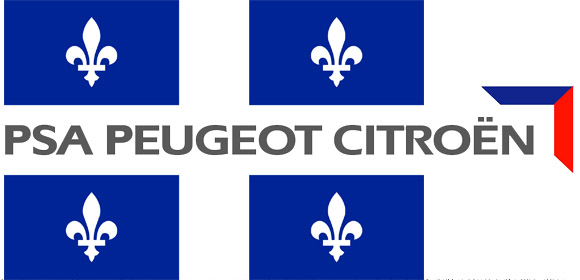During the 2016 World Economic Forum in Davos, in January, Québec Premier Philippe Couillard announced that $16 million (CDN) in government financing would be made available to support an innovative research and development initiative, in partnership with PSA Peugeot Citroën, Exagon Motors, Investissement Québec and Hydro-Québec subsidiary IndusTech, to share expertise in the field of high-performance electric vehicle components. He was accompanied by Jacques Daoust, Quebec’s Minister of the Economy, Innovation and Exports, and the Honourable Navdeep Bains, Canada’s Minister of Innovation, Science and Economic Development.
Whether this puts PSA Peugeot Citroën any closer to actually offering automobiles for sale again North America remains unclear.
PSA Peugeot Citroën stated it would lend its expertise in integrating the electric vehicle components, for which it would become the main customer for worldwide distribution. “The agreement with Investissement Québec, Exagon Motors and Hydro-Québec demonstrates that we have the agility to seize every available opportunity to boost our technological lead,” said Carlos Tavares, Chairman of the PSA Managing Board. “The partnership also underscores our interest in developing parts for high-performance hybrid and electric vehicles.”
The Quebec government’s contribution will be made up of a $10 million CDN equity interest and a $6 million CDN loan. Hydro-Québec will also be contributing $4 million CDN to the project, in addition to the services offered by its subsidiary TM4 to help with the development of an electric motor. On the surface it would appear that PSA Peugeot Citroën has found a convenient source of funding for development of electric vehicle technology. And for the Quebec Government’s part, they can now claim to be a player in the same.
“My government intends to make Québec a standard-bearer in the campaign to electrify transport,” said Québec Premier Philippe Couillard. “Our commitment to the project announced today and our 2015-2020 Transportation Electrification Action Plan are another milestone in the drive to develop the electric car sector, and they will help to spread a culture of innovation throughout Quebec.”
It was stated during the press announcement that in an initial phase, the study could lead to the development of components for high-performance electric vehicles. But just how beneficial will the $16M investment be? The resulting joint venture will bring together PSA Peugeot Citroën, French SME Exagon Motors, Investissement Québec and Hydro-Québec subsidiary IndusTech. However its first mission will be to conduct a feasibility study for an estimated $30.8 million CDN. If that’s the case the project will start in earnest with a near $16M funding deficit. Nevertheless each partner wanted to have their say in the launch announcement:
Exagon Motors, a pioneer in high-performance electric powertrains, designs, assembles and fine-tunes electric vehicles for the racetrack, and develops innovative technological platforms for various equipment manufacturers. “I am really looking forward to this unique partnership, which will enable us to deliver a technology that meets both performance and environmental criteria, without taking the fun and excitement out of driving,” said Luc Marchetti, Chairman of Exagon Motors. “This amazing adventure, which got started here at Exagon, is taking shape thanks to the unwavering commitment of the partners, especially PSA Peugeot Citroën and Investissement Québec, which has been a real catalyst for the project.”
“When we met with Exagon Motors and PSA Peugeot Citroën, we instantly saw the natural connection between their project and the opportunities available in Québec to make it happen,” said Pierre Gabriel Côté, President and Chief Executive Officer of Investissement Québec. “We were able to leverage a number of strengths to get this remarkable project up and running, including our own source of clean renewable energy, our existing manufacturing base for the transport industry and, in particular, our advanced aerospace industry expertise.
“Hydro-Québec is delighted to be supporting a real-world project in the field of electric transport, which is a priority for our company,” said Eric Martel, President and Chief Executive Officer of Hydro-Québec. “We play a very active role in the sector with, for example, Electric Circuit, our public charging network for electric vehicles, and our leading-edge technologies developed at the Hydro-Québec Research Institute. The fact that a major carmaker like PSA Peugeot Citroën is taking an interest in TM4 products is a testament to their quality and enviable reputation at the international level.”
“Canada’s government is determined to promote innovation within the Canadian economy and fully assert its role as an advocate of new investment, exports and growth,” said the Hon. Navdeep Bains, Canada’s Minister of Innovation, Science and Economic Development. “The financial backing provided to the joint venture formed by PSA Peugeot Citroën, Exagon Motors, Investissement Québec and Hydro-Québec is a powerful example of our determination to support companies that are focusing on innovation and collaboration.” But wait; the investment is provincial, so why is the federal governments taking any credit here? A handshake agreement that they will fund the other $16M? Could be the making of another automotive saga in Canada unseen since the days or the New Brunswick government investing to develop and manufacture the Bricklin.



